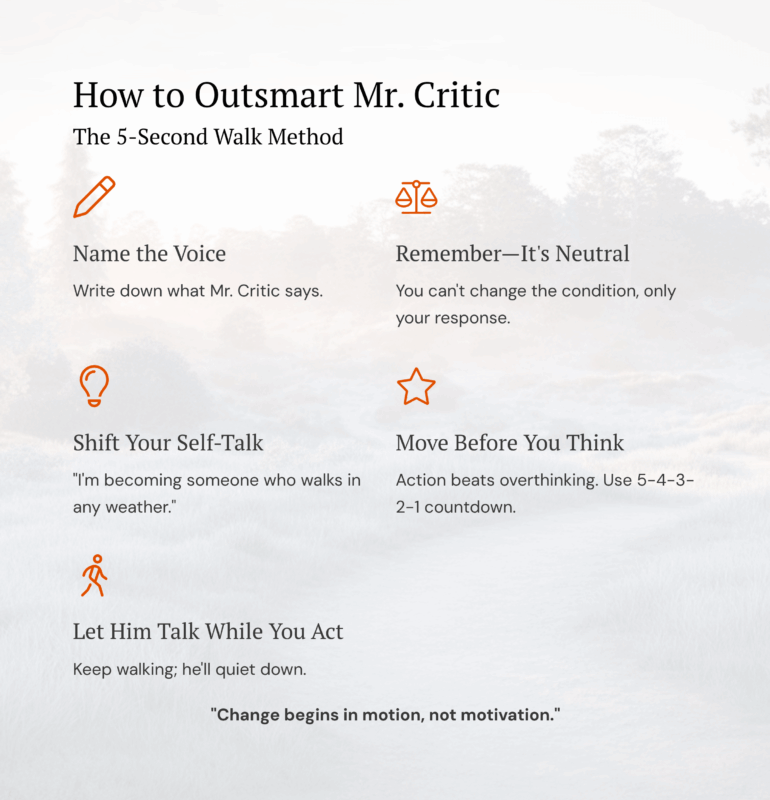Reading time: 9 minutes.
Quick Summary: You’re not lazy — you’re trapped in daily negotiations with Mr. Critic, the voice that talks you out of growth with perfectly reasonable excuses. This post reveals why “too hot,” “too tired,” and “not ready” always win, and teaches you the 5-second method to move before your brain builds its case. Building identity-based habits doesn’t happen through perfect conditions — it happens through imperfect action, repeated. – How to override your inner critic.
Why Do I Keep Postponing Things I Actually Want to Do?
It’s not laziness. It’s not lack of discipline.
It’s Mr. Critic—that voice in your head building a bulletproof case for why today isn’t the day. He sounds reasonable and concerned for your wellbeing, which is exactly why you keep listening.
By the end of this post, I want you to take one 5-second action—not think, not plan, just move. That single motion is how we start to break his spell.

Disclaimer: I’m not a therapist or neuroscientist—just someone who rebuilt their life the slow way. What I share here blends lived experience with credible research. If you’re struggling with your health or mental health, please speak to your GP or a qualified professional.
- The Script Sounds Familiar, Doesn’t It?
- What Makes Mr. Critic So Hard to Ignore?
- How Do I Stop the Daily Negotiation With Myself?
- How Can I Override Mr. Critic in the Moment?
- What Strategies Help When Willpower Isn't Enough?
- What Do I Do When I Fail or Skip a Day?
- Your Challenge: The First 5-Second Decision
- Key Concepts: Understanding Behavioural Change and Mental Resistance
- Further Reading: The Science Behind Behaviour Change
- Frequently Asked Questions
The Script Sounds Familiar, Doesn’t It?
Maybe he’s saying:
- “It’s too hot to walk”
- “You’re too tired to cook”
- “It’s too late to start that project”
- “You’re not ready yet”
Different words. Same script. Same result—you stay stuck.
This morning, he tried it with me: “It’s too hot. Skip today. Walk later when it’s cooler.”
Two years ago, I would have listened. Today, I walked anyway—not because I’ve mastered motivation, but because I learned how to recognize mental resistance for what it is and how to move despite it.
What Makes Mr. Critic So Hard to Ignore?
He sounds completely reasonable. When he says “It’s too hot” or “You deserve rest” or “You can do it tomorrow”—every word is technically true. Your brain’s definition of “best interests” is usually just “safest” or “most comfortable,” not what actually helps you grow.
Your brain isn’t trying to sabotage you—it’s trying to protect you. For 30+ years, it’s learned that discomfort equals danger, comfortable equals safe, and hot/tired/busy means skip it. These are neural highways, well-worn pathways your brain defaults to because they’re efficient.
Research from University College London found it takes an average of 66 days to form a new habit—though the range varies widely (18–254 days) depending on the complexity. The good news? Identity shifts start immediately, not after day 66.
But protection and growth? They rarely happen at the same time.
What’s the Pattern That Keeps Me Stuck?
It starts innocently enough. One skipped workout. One “I’ll start Monday.” One “I deserve a break.”
But watch the spiral:
- Day 1: Skip the walk, feel guilty
- Day 2: Guilt makes you avoid thinking about it, skip again
- Day 3: Mr. Critic delivers the verdict: “See? You always quit”
- Result: One missed day becomes proof of who you are
The real problem? You’re not stuck because you lack willpower. You’re stuck because every morning becomes a debate—and your own brain is a lawyer who never loses.
This is precisely why motivation fails as a strategy—you can’t rely on feeling inspired every single day. You need a system that works even when motivation is nowhere to be found.
How Do I Stop the Daily Negotiation With Myself?
The shift happens when you move from debating to deciding—from “should I?” to “this is what I do.” Not because you’re always motivated (you’re not), but because you’ve learned to act despite what Mr. Critic says.
What Can Ancient Philosophy Teach Us About Modern Self-Discipline?
The Stoics understood this 2,000 years ago through a concept called preferred indifferents: things like heat, cold, tiredness, or discomfort are neither inherently good nor bad. They just are. What matters is how you choose to respond to them.
As Marcus Aurelius wrote in Meditations: “You have power over your mind—not outside events. Realize this, and you will find strength.”
Modern psychology now validates what the Stoics sensed instinctively—that steady daily practice changes how the mind responds to stress. The NHS echoes this idea, noting that building mental resilience through consistent routines can significantly improve emotional regulation.
You can’t control the temperature or how tired you feel. But you can control your response.

You’re not a fitness person. You’ve never been a fitness person. Why pretend now?”
That was Mr. Critic three months into my walking routine, trying to convince me I was playing dress-up. That I wasn’t “really” someone who exercises—I was just temporarily doing it.
I recognised that voice for what it was: an old identity fighting for survival.
What does your Mr. Critic say when you start to change?
How Do Identity Shifts Make Habits Easier?
When you stop saying “I can’t walk in this heat” and start saying “I am becoming someone who walks in any weather,” everything changes.
This isn’t positive thinking—it’s identity reconstruction.
You don’t have to believe it for it to work. This isn’t about tricking yourself into feeling motivated. It’s about giving your brain a different story to follow.
Your brain is already following a story—”I’m someone who skips workouts when it’s hot.” That story has 30 years of evidence. You’re not replacing it with fairy tales. You’re building new evidence.
And the language “I’m becoming” reminds you you’re in the evidence-gathering phase.
Because here’s what I discovered: Action creates belief faster than belief creates action.
As James Clear writes in Atomic Habits, identity-based habits create lasting change by focusing on who you wish to become, not just what you want to achieve.
Every time you move despite Mr. Critic’s protests, you’re doing two things at once: exercising your body and building evidence for who you’re becoming.
Why Do Small Wins Matter More Than Big Goals?
Here’s what most people miss: small choices don’t just add up—they multiply.
One walk when it’s hot doesn’t just burn calories. It rewires your self-concept. You become someone with evidence that discomfort doesn’t stop them.
That evidence spreads everywhere. The person who walks when it’s hot starts showing up differently in all areas of life.
Why? Because they’ve proven to themselves they’re someone who chooses growth over comfort
Should I Build Habits Alone or With Community Support?
Here’s where people split into two camps—and both are right.
Some people transform through community: accountability partners, group challenges, public commitments, weekly check-ins.
Others need to cultivate a self-discipline mindset first: if external motivation fades, they need an internal anchor.
The real question isn’t which is better. It’s which is honest for you.
And sometimes what looks like “lack of motivation” is actually fear disguised as excuses.
What matters: Build the system that actually works for your brain, not the one that sounds most impressive.
So what if you could act before that voice finishes its speech?
How Can I Override Mr. Critic in the Moment?
Here’s the 5-second method for when Mr. Critic shows up with his “too hot,” “too tired,” or “too late” speech:
- Name your Mr. Critic moment.
What is he saying to you right now? Write it down. Make him visible. - Remember—it’s a preferred indifferent.
You can’t change the condition. You can change your response. - Shift your self-talk.
Don’t say: “I can’t walk in this heat.”
Say: “I am becoming someone who walks in any weather.” - Move immediately (before your brain kills the idea).
Focus on putting on your shoes. That’s your only job. Mel Robbins discovered the “5-Second Rule”—you have about five seconds from the impulse to act before your brain talks you out of it. Count backwards: 5-4-3-2-1, then move. I capture this in my own way: the moment I hear Mr. Critic start his pitch, I’m already moving. No debate. No negotiation. - Let him talk while you act.
“Yeah, I hear you.” Then keep walking. After two minutes, he goes quiet.
Because you’re already doing the thing.

What Strategies Help When Willpower Isn’t Enough?
- Use a mantra: “This is what I do.” or “I’m becoming someone who..
- Chunk it down Not “10,000 steps”—just “walk to the end of the street.
- Stack it with joy: Music, podcast, sunlight.
- Celebrate the decision, not the distance: The win is lacing up, not finishing
- on the first step only: Lower the barrier to starting.
What Do I Do When I Fail or Skip a Day?
You won’t do this perfectly. Some days Mr. Critic will win.
You’ll skip the walk. Eat the cake. Stay on the sofa.
That’s not failure—that’s being human.
The difference between people who transform and people who stay stuck? They start again the next day without drama.
No punishment walks or shame spirals. No “I’ve ruined everything.” Just: “Okay, that was yesterday. Today I walk.”
The identity isn’t built through perfection — it’s built through returning, one imperfect action at a time..
Your Challenge: The First 5-Second Decision
As you’re reading this, what is Mr. Critic saying to you?
Maybe it’s:
- The workout you’re putting off
- The healthy meal you’re too tired to cook
- The project you’re “not ready” to start
- The conversation you’re avoiding
This is it—your Mr. Critic showdown.
Count down: 5-4-3-2-1.
Then do the smallest version of the thing you’ve been avoiding.
Before you close this tab, name your Mr. Critic excuse—and take one 5-second action toward your new identity.
That’s how change begins—not through motivation, but through motion.
Key Concepts: Understanding Behavioural Change and Mental Resistance
This approach integrates several evidence-based principles for overcoming resistance to change and building sustainable habits. Identity-based habit formation focuses on becoming the type of person who naturally performs desired behaviours, rather than relying solely on willpower or motivation.
The concept of Mr. Critic represents the brain’s protective mechanisms — neural pathways developed over decades that prioritize safety and comfort over growth.
Stoic philosophy, particularly the principle of preferred indifferents, teaches us that external circumstances (heat, tiredness, discomfort) are neutral — our response to them determines outcomes. This aligns with modern cognitive behavioural psychology, which emphasizes that thoughts influence feelings and behaviours, but we can interrupt this cycle through immediate action.
Applying Stoicism in daily life means recognizing what we can and cannot control, then choosing our response deliberately.
The 5-Second Rule in Practice
The 5-second rule leverages our understanding of decision paralysis: the longer we deliberate, the more our brain generates reasons not to act. By moving within five seconds of impulse, we bypass the negotiation phase entirely. This creates what behavioural scientists call implementation intentions — pre-decided responses to specific triggers that reduce cognitive load in the moment.
Building a self-discipline mindset happens not through perfection but through repetition and return. Research on habit formation shows that consistency matters more than intensity — missing one day doesn’t erase progress if you resume the next day.
This approach to personal growth emphasizes building evidence for a new identity through small, repeated actions that compound over time.
Community, Accountability, and Self-Discipline
The method also addresses the role of community accountability versus internal motivation, recognizing that different psychological profiles benefit from different support systems. Some thrive with external accountability structures, while others require a self-discipline mindset that persists when external motivation fades.
Ultimately, this framework for overcoming resistance to change and mental resistance isn’t about eliminating the critical inner voice — it’s about learning to act despite it, transforming the relationship between thought and action, and gradually rewiring neural pathways through consistent choice-making in alignment with your desired identity.
Further Reading: The Science Behind Behaviour Change
If you’d like to explore the research behind these ideas, these studies and summaries explain how habits form and why small, consistent actions work:
- How Are Habits Formed? (UCL Study, 2009) – The original study by Phillippa Lally showing it takes an average of 66 days (range 18–254) to form a new habit.
- The Science of Habits — Psychology Today – A practical explanation of why repetition and small goals help habits “stick.”
- Why Behaviour Change Is Hard — Harvard Health – Examines why relapse and resistance are normal parts of growth.
Frequently Asked Questions
How long does it actually take to form a new habit?
Research from University College London shows it takes an average of 66 days to form a habit, though the range varies significantly (18–254 days) depending on complexity. The good news? Identity shifts — the feeling of “this is who I am” — can begin almost immediately, even before the habit becomes automatic.
What if I don’t believe identity-based language works for me?
You don’t have to believe it for it to work. Think of “I’m becoming someone who…” as an experiment, not an affirmation.
Action creates belief faster than belief creates action — you’ll start believing you’re that person after you’ve gathered evidence through repeated actions.
Is it better to build habits alone or with accountability partners?
Both approaches work, but for different people.
Community accountability helps those who thrive on connection and shared goals.
Internal discipline matters for those who notice external motivation fades over time.
Many people benefit from combining both — community for tough days, and internal consistency for solo moments.
What should I do when I skip a day or break my streak?
Start again the next day — no drama, no punishment, no shame.
Identity isn’t built through perfection; it’s built through returning.
Missing one day doesn’t erase your progress; it’s just pressing pause. Press play again tomorrow.
Why does Mr. Critic always sound so reasonable?
Because he’s using 30+ years of evidence that comfort keeps you safe.
Your brain learned that discomfort equals danger, so it genuinely believes it’s protecting you.
The problem is, protection and growth rarely happen at the same time — growth requires stepping into discomfort.
How do I know if my resistance is Mr. Critic or a genuine physical limitation?
This is crucial.
Mr. Critic uses comfort-seeking excuses — “too hot,” “too tired” — that usually disappear once you start moving.
Genuine physical limitations (illness, injury, chronic conditions) persist regardless of mindset or motivation.
When in doubt, consult your GP or qualified healthcare professional. This method addresses psychological barriers, not medical ones.
Ready to build habits that actually stick?
The complete system I use—including the five practices that took me from groundhog day to transformation—is available in my free Small Habits Guide.
Take a Moment to Reflect

Journalling Prompt
Where does your Mr. Critic speak the loudest?
Write down what he usually says, and how it feels to listen.
What’s one small action that would prove him wrong today?
(A walk? Sending that message? Starting the first five minutes?)
Describe what would happen if you did it — before he finishes his speech.
Found this helpful? You can buy me a coffee to support more writing like this. Every cup helps me keep creating resources
Kel is the writer behind Everyday Mastery, where she shares the real, messy, and meaningful process of building habits, resilience, and self-belief from the ground up. Her writing blends ancient philosophy with modern science, always focused on small, practical steps that lead to lasting





